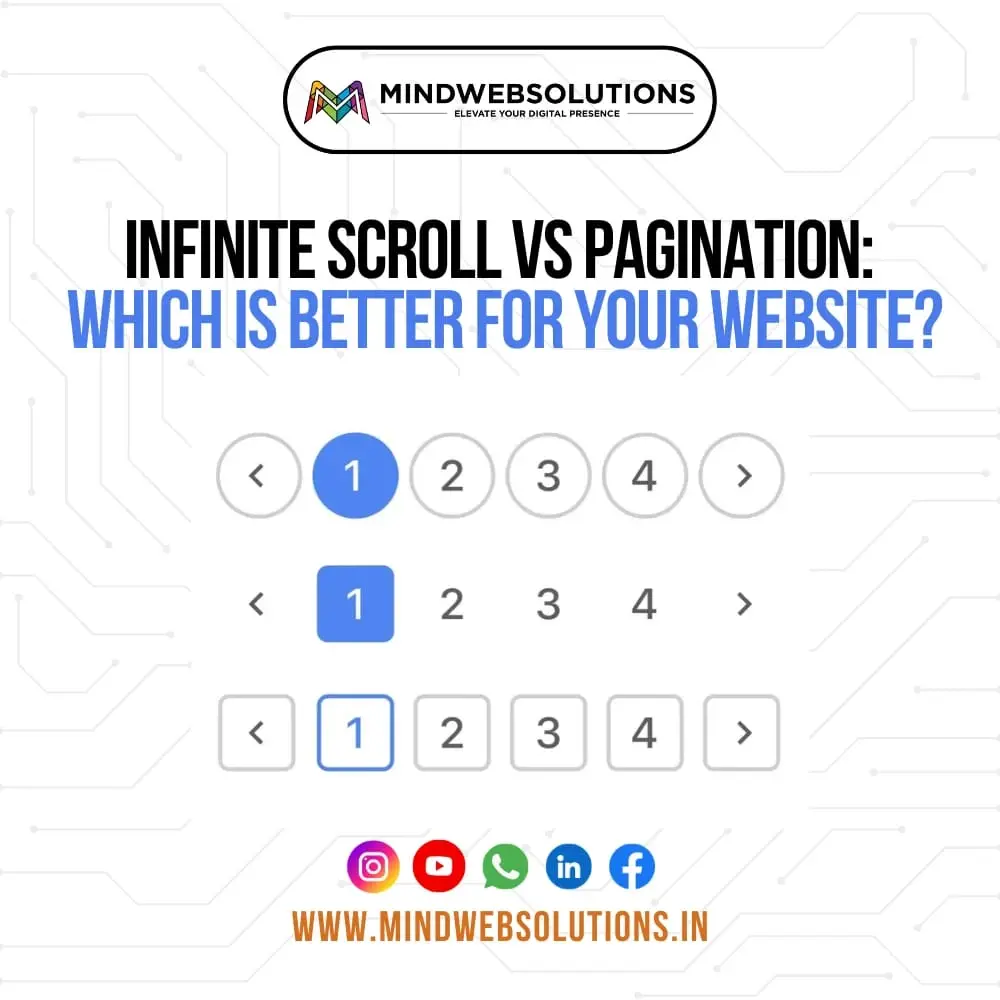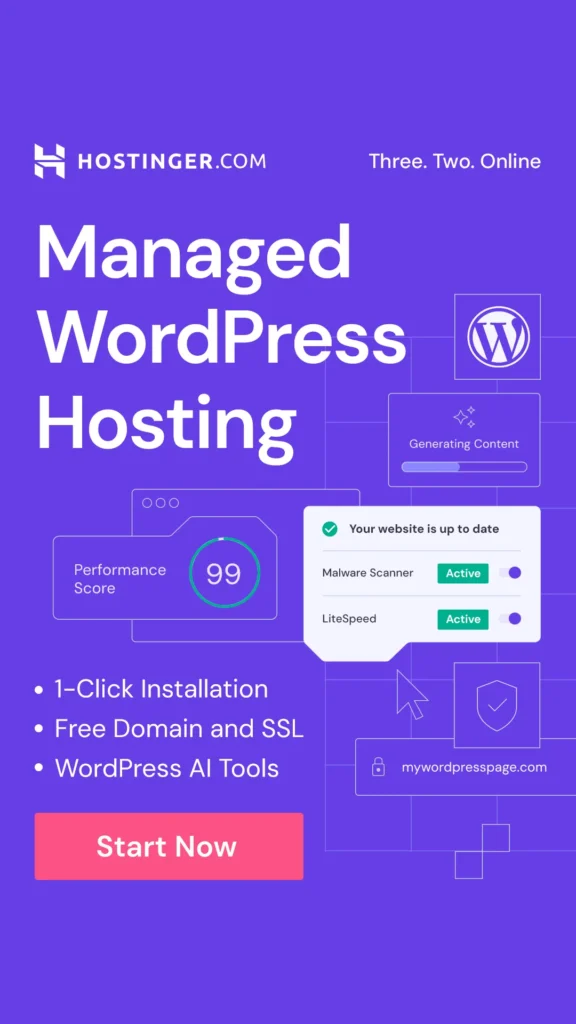Infinite Scroll Vs Pagination
Infinite Scroll is a method where content continuously loads on the page as much as you scroll. You’ve probably seen this on social media platforms like Instagram and Twitter, where new posts appear automatically as you scroll, with no need to click “Next” or move to a different page.
On the other hand, Pagination divides content into discrete pages, requiring the user to click to navigate through different sections. Think of e-commerce sites like Amazon, where products are split into pages, and you move from one page to another.
Here is a detailed difference between Infinite Scroll vs Pagination SEO:
Points of Difference | Infinite Scroll | Pagination |
Content Loading | Content loads automatically as the user scrolls. | Content is divided into pages. |
User Interaction | Minimal interaction (no need to click as content loads automatically on scrolling) | Requires user interaction to click and navigate pages |
Best For | Content-heavy websites like social media. | E-commerce websites and search page results |
User Control | Less control over navigation. Difficulty to access older content | Gives control; easy to access old pages |
Footer Accessibility | Difficult to reach the footer due to endless scrolling. | Easier to access the footer and other links |
Engagement | Promotes higher engagement for content-driven platforms. | Encourages structured browsing with clear stopping points. |
Preferred For | Mobile users | Works well for desktop; may require more effort on mobile. |
When To Use Infinite Scroll?
Infinite scroll is an excellent option for websites with content that doesn’t require strict structure, especially when new content keeps appearing.
Here’s when infinite scroll makes sense:
- Content-heavy platforms: If you run a website like a blog or social media platform, where there is an endless feed of new articles, posts, videos or images, an infinite scroll is perfect. Instagram’s reels section is one perfect example of infinite scrolling.
- Time-sensitive content: News websites or forums that provide time-sensitive updates can benefit from infinite scroll. Users can quickly get updates on the latest information without the hassle of navigating multiple pages.
- Visual-centric websites: For websites heavy on visual content, like portfolios, photography, or design sites, infinite scroll lets users immerse in the images without disruption.
When To Use Pagination?
While infinite scroll works well for content-driven websites, pagination is often more suitable in structured environments where control and clarity are important.
- E-commerce websites: Pagination is ideal for e-commerce sites like Amazon, Flipkart, etc. It allows users to process the content (products or services) in a few chunks. It displays the content in a more digestible way without overwhelming users with too much information at once.
- Search result pages: Sites like Google or job search platforms benefit from pagination, giving users the ability to review results in smaller sets and revisit specific pages easily.
- Knowledge-based websites: Educational sites or resources with structured content should use pagination to make it easier for users to jump between sections or chapters.
What Are The Pros And Cons Of Pagination?
Like any navigation method, pagination has its benefits and drawbacks. Let’s explore them:
Pros of Pagination
- Enhanced user control: Pagination allows users to browse at their own pace. They can choose to skip pages or revisit sections without losing their place.
- Improved performance: Websites that paginate content often have faster load times because they only load a limited amount of data at once.
- Organized content consumption: When you need structured browsing, like in e-commerce or articles with defined sections, pagination provides clarity and helps users understand where they are within the site.
Cons of Pagination
- Potential engagement loss: Pagination can interrupt the user experience, as users must constantly click through pages, which can discourage them from continuing.
- Lower page views: Users may not be willing to click through multiple pages, which might limit how much of your content they see.

What Are The Pros And Cons Of Infinite Scroll?
Infinite scroll has its own set of advantages and disadvantages. These include:
Pros of Infinite Scroll
- Seamless content experience: Infinite scroll eliminates the need for constant clicking, allowing users to view content continuously. This results in higher engagement, especially for content-rich sites.
- Increased page views: Since users aren’t clicking away, they tend to see more of your content in one session. According to a study, infinite scroll can boost the number of page views by up to 25%.
- Better for mobile users: With most users accessing websites on mobile, infinite scroll offers a more user-friendly experience by minimizing clicks.
Cons of Infinite Scroll
- Overwhelming for users: Too much content can overwhelm users, making it harder to find specific information. This can be frustrating, especially when looking for older posts.
- Footer access issues: Many websites place important information like contact details or links in the footer, which can become hard to reach with infinite scrolling. With infinite scrolling, users usually fail to reach the bottom of the page where this content resides.
- Slower load times: Loading new content as users scroll can strain site performance, especially if the website is heavy on media like images and videos.
In the debate of infinite scroll vs pagination, the best choice for your website comes down to your content and user goals. By understanding the pros and cons of each, you can make an informed decision.
What Are The Usability Issues With Infinite Scroll?
Infinite scroll isn’t always the perfect solution.
One of the biggest problems is that users may find it difficult to locate the footer, which usually contains vital links and information.
Additionally, scrolling takes forever for the users to find specific content. They can’t simply click back to any specific page like with pagination.
Some users also dislike infinite scroll because it can feel like a “dark pattern.” It manipulates user behaviour by making it harder to stop scrolling. This often leaves users feeling like they’re trapped in an endless loop of content.
Can Google Crawl Infinite Scroll More Effectively Than Pagination?
When it comes to SEO, the battle between infinite scroll and pagination also extends to search engine crawling.
Pagination is often easier for search engines to crawl because it provides distinct URLs for each page of content. This means Google can easily understand and index your content in chunks.
On the other hand, infinite scroll presents challenges for search engine crawlers. Google may have trouble loading the continuous stream of content, especially if the JavaScript or AJAX that powers the infinite scroll isn’t SEO-friendly. If your infinite scroll setup isn’t properly configured, parts of your content might never get crawled or indexed.
Frequently Asked Questions About Infinite Scroll vs Pagination
There’s no one-size-fits-all answer. Infinite scroll works best for content-rich sites where continuous browsing is key. Meanwhile pagination is ideal for more structured, controlled content like e-commerce.
Yes, infinite scroll improves engagement by keeping users on the site longer. After all, it’s all about scrolling till the end to keep them hooked.







